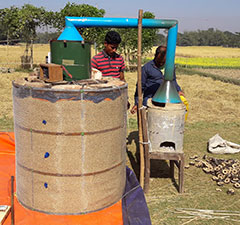April 18, 2017
Feed the Future Lab featured in Nature magazine

Kansas State University's contributions in developing and implementing an innovative portable dryer for villagers in Bangladesh has drawn the attention of Nature magazine, the international weekly journal of science.
Jagger Harvey, director of the Feed the Future Innovation Lab for the Reduction of Post-Harvest Loss, was interviewed for a story that has appeared in the online edition of Nature, at nature.com.
"Farmers, the Bangladesh government, and other actors are excited at the prospect of reducing post-harvest losses with this effective, portable and affordable technology for rice," Harvey said. "It has been featured in the media, and the government is considering it for an official subsidy in the near future."
The portable dryer was developed jointly by researchers at Bangladesh Agricultural University, Kansas State University and the ADM Institute for the Prevention of Postharvest Loss at the University of Illinois, Urbana-Champaign. The dryer helps to preserve grain and reduces the risk of mold accumulation during storage.
Harvey said that the dryer has been deployed in 20 villages, and an additional 30 villages have been selected as the researchers scale up the project. Rice is a crucial staple food in Bangladesh, with 13 million farmers involved in rice production.
The article in Nature is part of an editorial on the role of research in helping to drive international development. Journalist Amy Maxmen focuses on how the various innovation labs supported by the U.S. Agency for International Development are using their research capacity to improve agriculture in developing countries.
"Being featured in an esteemed publication like Nature, as a success of USAID investments and of the U.S. government's Feed the Future program, is a distinct honor," Harvey said. "It demonstrates the essential role research must play as a catalyst for accelerated global development."
"This involvement in international agriculture, addressing global agricultural issues and improving livelihoods on the front lines, in turn brings tangible benefits back to farmers and the private sector in the U.S., as well as improving global and national security."
Harvey said the Feed the Future Innovation Lab for the Reduction of Post-Harvest Loss has an aggressive timeline to take innovations, adapt them to a local context and package them for adoption and scale-up. The portable dryer is a good example of that; many Bangladeshi farmers are purchasing dryers to protect their crops.
"This is the mission of innovation labs more broadly, to accelerate technology and capacity transfer to improve livelihoods of resource-poor farmers, consumers and others where agricultural improvement is driving development," Harvey said. "The dryer is one of our program's big successes."
More information about the Post-Harvest Loss Innovation Lab can be found at ksu.edu/phl.
